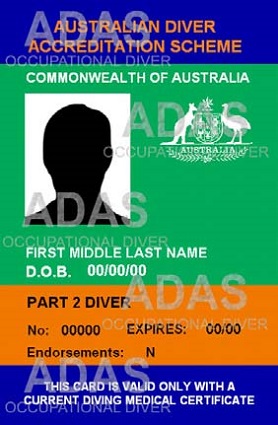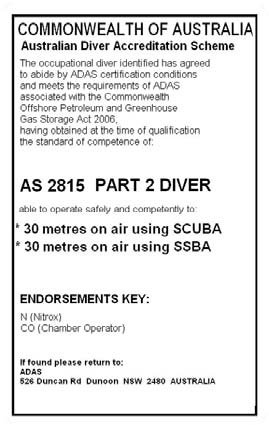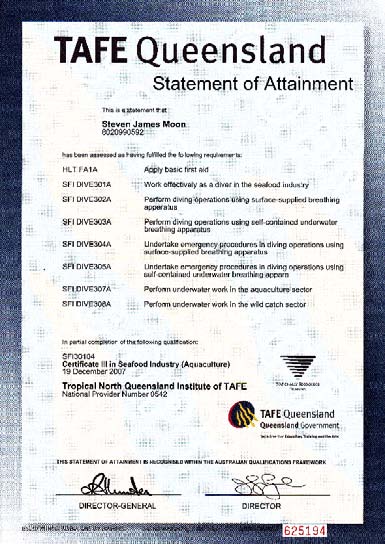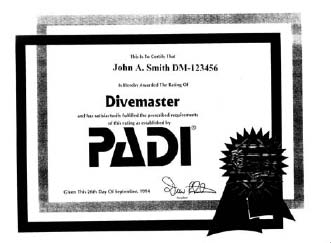Examples of competencies for diving work
Ensuring that all persons associated with diving work are competent is essential to ensure work health and safety. Persons undertaking diving work must be competent and have the knowledge and skills required to safely perform their work.
The risks associated with working under pressure in a non-respirable environment combined with the varied nature of diving work requires that dive workers must be able to demonstrate their competence prior to commencing diving work.
Persons conducting a business or undertaking (PCBU) must first determine what type of diving work is being undertaken. Diving work is classed as either:
- high risk diving work – typically associated with structures
- general diving work – all other diving work that is not high risk diving work. There are three competency options available for this category. One for most general diving work and two limited options available for specific circumstances involving visiting overseas scientific divers and other persons for whom diving is not a part of their normal work.
High risk diving work
The PCBU must ensure that divers and dive supervisors are competent in accordance with the standards listed in Australian/New Zealand Standard AS/NZS 2299:2015 Occupational Diving Operations, Part 1 – Standard Operational Practice. For example for high risk diving work involving diving on surface supply to 30 metres, the diver could hold an Australian Dive Accreditation Scheme (ADAS) Part 2 Diver accreditation (see example below) and the dive supervisor could hold and ADAS Part 2 Dive Supervisor accreditation.
 |  |
General diving work
In determining the most appropriate competency options for general diving work, the PCBU should review the work and ensure that the competency option selected is relevant to the work. Issues to consider should include:
- the diving environment
- the diving equipment and breathing gas to be used
- the decompression schedule to be used
- the tasks to be undertaken
- any tools to be used
- any other hazards associated with the task.
The competency for general diving work consists of two parts.
Firstly the diver must hold an appropriate qualification. The qualification can be either:
- A statement of attainment from a relevant VET course for relevant diving units of competency under the following subject streams, for example:
- Scientific diving – Conservation and land management (RTD)
- General diving – Hyperbaric operations stream (809) (for example an ADAS certificate)
- Harvesting and aquaculture – Seafood industry stream (SFI) (see below example)
- Recreational diving – Outdoor recreation stream (SIS).

- A certificate from a dive training organisation that is the equivalent to Australian/New Zealand Standard AS/NZS 4005:2000 Training and certification of recreational divers, Part 2 – recreational SCUBA dive supervisor (e.g. a Divemaster certificate issued by the Professional Association of Dive Instructors – see example below).

Secondly the diver must have, through training, qualification or experience, acquired sound knowledge and skill that is relevant to their general diving work in relation to the following competency checklist:
- the application of diving physics
- the use, inspection and maintenance of diving equipment (including emergency equipment) and air supply of the type to be used in the proposed general diving work
- the use of decompression tables or dive computers
- dive planning
- ways of communicating with another diver and with persons at the surface during general diving work
- how to safely carry out general diving work of the type proposed to be carried out
- diving physiology and first aid.
A dive supervisor for general diving work must be competent to dive and have experience in the diving work to be supervised (e.g. as recorded in the diver's log book).
General diving work – Incidental diving work
The incidental diving work competency option for general diving work allows for workers whose usual work does not involve diving. The diving work must also be incidental to the business. The diver must have, through training, qualification or experience, acquired sound knowledge and skill in relation to the competency checklist (see above) and have 15 hours of diving experience (depth conditions apply).
The diving work must be:
- limited diving – incidental divers must not carry out diving work involving:
- diving to a depth below 30 metres
- the need for a decompression stop
- the use of mechanical lifting equipment or a buoyancy lifting device
- diving beneath any thing that would require the diver to move sideways before being able to ascend
- the use of plant that is powered from the surface
- diving for no more than 28 days during a period of 6 months.
- supervised in the water by another diver competent to undertake general diving work.
Example – Underwater film making:
- An actor is required to be filmed acting as a recreational diver for a specific film sequence in a shallow tropical marine environment that is limited diving.
- The PCBU assesses the diver's qualifications and log book and determines that the actor has relevant knowledge, skills and experience to safely undertake the underwater film making work, and has15 hours of relevant diving experience.
- The person must ensure that the diver is supervised in the water by another diver competent to undertake general diving work.
General diving work – Limited scientific diving work
The limited scientific diving option is designed for use solely by visiting overseas scientific divers who are competent to undertake general diving work but are not able to demonstrate their competency to dive in the ways prescribed under the general diving work competency option. The diver cannot be permanently resident in Australia and the diving work must be carried out for the purpose of professional scientific research, natural resource management or scientific research as an educational activity. These divers do not specifically require in water supervision.
The diver must have, through training, qualification or experience, acquired sound knowledge and skill in relation to the competency checklist (see above) and have 60 hours of diving experience (depth conditions apply).
Limited scientific divers may only carry out limited diving (see above).
Example:
- An overseas based scientific diver wishes to undertake scientific diving work at a research facility (the person conducting a business or undertaking ) in Australia for two weeks.
- The person conducting a business or undertaking reviews the overseas qualifications, experience and diving work history of the diver to ensure they have relevant knowledge, skills and experience, and 60 relevant logged hours of diving.
- The diver is then able to undertake limited diving work that is for scientific purposes.
Records
The PCBU must keep written evidence to demonstrate the diver's and dive supervisor's competence for at least 12 months after the work is carried out.
Written evidence could include:
- current qualifications
- certificates
- training records
- assessment tools and outcomes
- diver's logbooks
- dive safety logs
- statutory declarations.
It is important that the written evidence is adequate to demonstrate that the diver has the sound knowledge and skill to undertake the general diving work safely and that the dive supervisor has the necessary experience for that role.